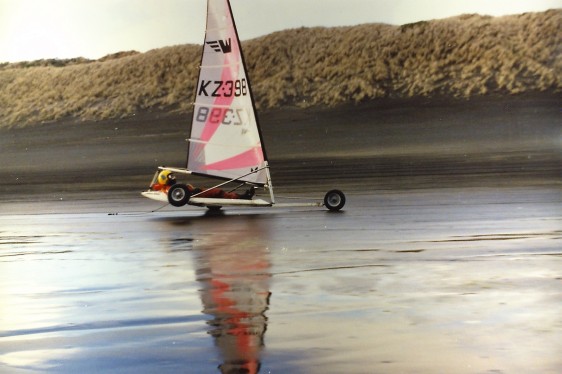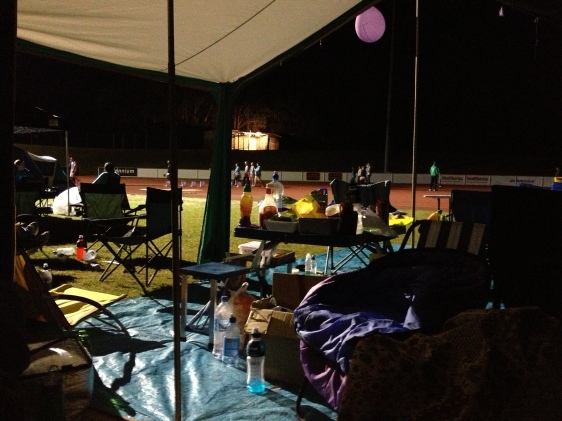 Hi, I’m ACC 18 Number 201905123684, I’ve swapped the numbers a little, although it probably doesn’t make any difference. I’m fairly well known.
Hi, I’m ACC 18 Number 201905123684, I’ve swapped the numbers a little, although it probably doesn’t make any difference. I’m fairly well known.
My back story consists largely of digital files and probably a few manila folders and other storage media in several Accident Compensation Commission, medical, physio, specialist, hospital, surgeon, Occupational Therapist, Pain Specialist offices around New Zealand. They get shuffled from time to time.
Having said that, everyone on my journey has been friendly, thoughtful and most have tried to help me. A few, who I haven’t met, somewhere in the system have the job of helping ACC to not have to pay for my surgery, with considered justification. I’ll talk about that too.
 In March 2018, I hurt my back getting ready to set up for the Auckland Cancer Society’s North Shore Relay for Life event. The annual 18-hour relay, raising funds for cancer services which I have completed 6 times. I started with my family in honor of family members who have died from cancer, including my late father-in-law.
In March 2018, I hurt my back getting ready to set up for the Auckland Cancer Society’s North Shore Relay for Life event. The annual 18-hour relay, raising funds for cancer services which I have completed 6 times. I started with my family in honor of family members who have died from cancer, including my late father-in-law.
Then I got cancer myself, and during the fund-raising process I’m proud to say that over 30 men got tested for Prostate cancer because of my story, but I’m getting ahead of myself. I was given the honour of speaking at the opening, having refreshments in the survivors’ tent and carrying one of the flags in the first survivors’ lap. A humbling and emotional experience.
 Trying, unsuccessfully, to awkwardly pick up a bag of tent poles out of a trailer provided at the venue by the organizers, for a 4 room tent, would set off a chain of events that has opened my eyes to the plight of many New Zealanders, who desperately want to work, but can’t, because the health system is underfunded, under resourced and inefficient.I became one of them.
Trying, unsuccessfully, to awkwardly pick up a bag of tent poles out of a trailer provided at the venue by the organizers, for a 4 room tent, would set off a chain of events that has opened my eyes to the plight of many New Zealanders, who desperately want to work, but can’t, because the health system is underfunded, under resourced and inefficient.I became one of them.
I have a job. I hold a management role at the NZTA, a job I love with an awesome team of people who provide mostly Real Time Travel Information to motorists and travelers around the country.
It’s been 14 months since my injury.
My Occupational Therapist, GP, Pain Specialist and my Manager have agreed that I can work 2 three-hour days a week. ACC funds taxis to get me there as I could be a danger to myself and others, under the daily pain medication regime I’m on. That allows me to do something productive as well as socialize with my colleagues and not feel totally divorced from my work.
It was part of my back to work program, which has stalled since the Orthopedic Surgeon advised me that we had ‘painted our backs into a corner, having tried every alternative to fusion and discectomy surgery.’
I am incredibly grateful that the NZTA hasn’t dropped me under the bus and that I still have a job, although I am not currently able to perform my normal duties.
Over the next while, along with other activities, I’m going to talk about my life, one shared with my family and friends, colleagues and the health system.
I’m going to talk about what happened, about why I still can’t go back to work, why I am still waiting for surgery after 14 months. How ACC don’t want to pay for the surgery, how I can’t afford to pay for the excess if I went private, and my current experience with the Auckland District Health Board and North Shore Hospital, where I was referred as an Urgent Patient on the 9th of April.
I have not yet been able to connect with the person who makes appointments. When I rang them at the end of April, the hospital representative at the Patient Service Centre said they must see me within 4 months, and it was too early to ring. I was told it wasn’t worth ringing before the end of May and even then, not to get my hopes up. I rang today and left a message on their voicemail.
I have Prostate Cancer.
 During the dark days of 8 weeks of radiation treatment, followed by chemicals, I think I had less than a week off work, on the odd day when I was so fatigued that I couldn’t function.
During the dark days of 8 weeks of radiation treatment, followed by chemicals, I think I had less than a week off work, on the odd day when I was so fatigued that I couldn’t function.
I arranged my radiation sessions to be around 7AM every morning so that I could go straight on to work afterwards, and still be on time. That’s how I roll.
I am now fortunately in remission, and my latest blood test last week showed a good result. The irony is that Cancer is fatal and there is every possibility that one day, hopefully decades away, it will kill me.
On the other hand, chances are very good that after back surgery, I will be a little sore from time to time, manageable with over the counter pain relief. Yet, for cancer I had less than a week off work and with a back injury it has now been over a year!
Mine is a common story, but one with which for the first 40 years of my working life I had no personal experience. I’d heard stories, mostly about people who allegedly don’t want to work, and enjoy living off the taxpayer’s dollar, but there are so many more people like me, who desperately want to work and contribute to society. If you have a look at my profile on LinkedIn you will read that my goal in life has always been to help people.
I consider my work important, a contribution to reducing the pain of traveling on our ever more congested road network by offering information about planned and unplanned events, about expected delays, alternative routes, alternate modes of transport, helping people plan for holiday road trips and much more.
I lead a team of awesome people who really care about you, their customers. It matters to me, but I’m being kept from it.
It’s funny, we talk about the cost to society of people who are needlessly killed on our roads. The cost takes into consideration the contribution they will make to the country’s GDP over their lives. Yet, the cost to taxpayers to get me back to work by providing me with back surgery, is far less than the cost of keeping me away from work.
As I said, mine is a common story, but it’s not one that people like you and I can easily relate to, unless we are directly affected.
Of course, in each instance, it’s not just the patient, it’s our partners, our family, our friends, our colleagues and of course the workload that must be done by someone else, or perhaps not at all.
 I’ll try to make the story interesting, maybe even have the odd laugh. But let me tell you, this is no joke. I have gone from being super positive and highly motivated, with a bucket list of things I want to do which I prepared when I found out I have cancer, to being virtually trapped in my home, on the border of depression, not being able to stand, sit or lie down for any length of time without significant pain.
I’ll try to make the story interesting, maybe even have the odd laugh. But let me tell you, this is no joke. I have gone from being super positive and highly motivated, with a bucket list of things I want to do which I prepared when I found out I have cancer, to being virtually trapped in my home, on the border of depression, not being able to stand, sit or lie down for any length of time without significant pain.
I’ll share an email I sent to ACC after having read a report prepared for them by a specialist, who said that “The patient appears to be doing reasonably well”.
Interestingly, this person who was paid by ACC to investigate my case did not once speak to myself, my GP, my Orthopedic Specialist, my Case Manager, my Pain Manager or my Physio.
I guess ‘reasonably well’ is a relative expression. I’m not dying.
The email is quite personal, but that’s really the point. I am a person.
Anyway, that’s it for now. I’m hoping to hear back from the hospital today and am getting on with other things in the meantime.
You may find my story interesting; you may be in a similar situation yourself. I know I’m not alone. I understand it was stated in Parliament Question Time last week that the number of elective surgeries completed last year was 10,000 ‘elective’ surgeries less than the year before. Reasons included strikes and funding. It’s little wonder it could take months for me to just be able to speak to someone.
Feel free to comment or ask questions. I know I’m not alone here and you may be in a similar situation to mine. I grew up as a fan of New Zealand’s welfare state. I learned that we are the system and that if we don’t stand up for something, no one else will either. I just didn’t know how bad it was.
So, you there. Have you had any experiences like mine? How do you get some action without ruffling people’s feathers and having your manila folder dropped down the list a little? Of course, that wouldn’t happen would it?
I welcome your comments.



 Now I just need the energy to start training for
Now I just need the energy to start training for 
